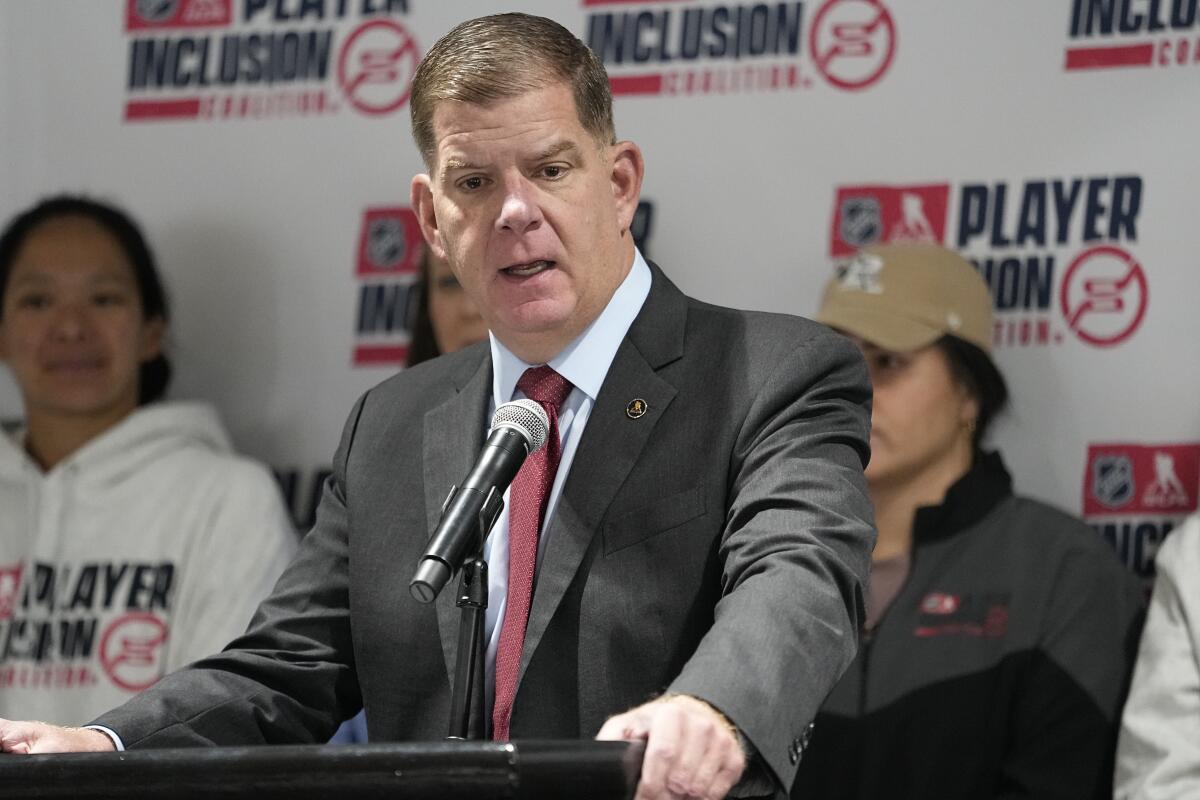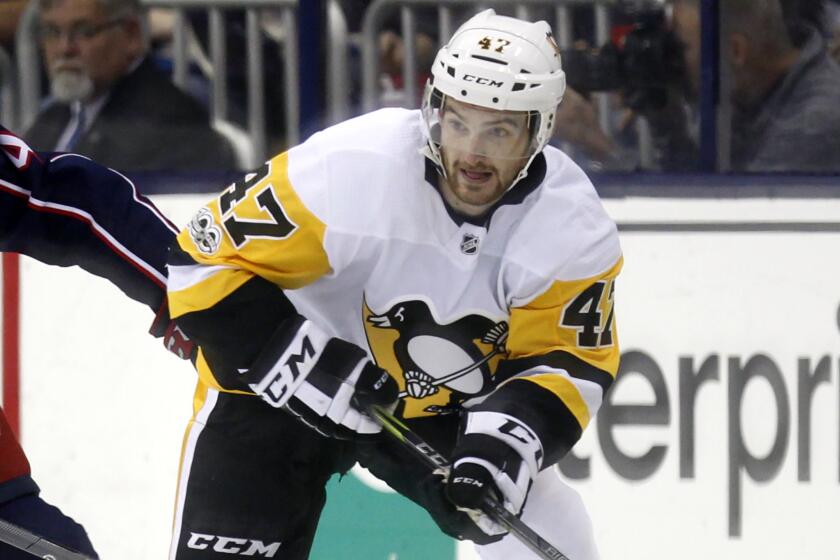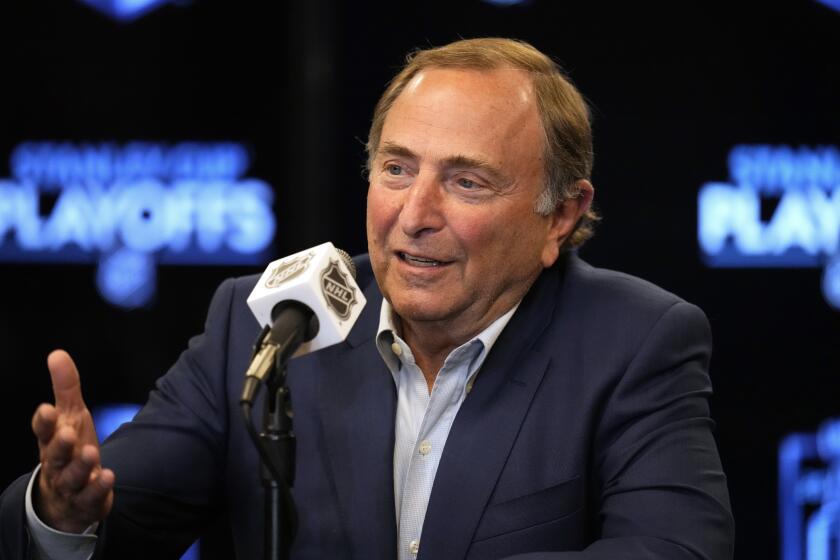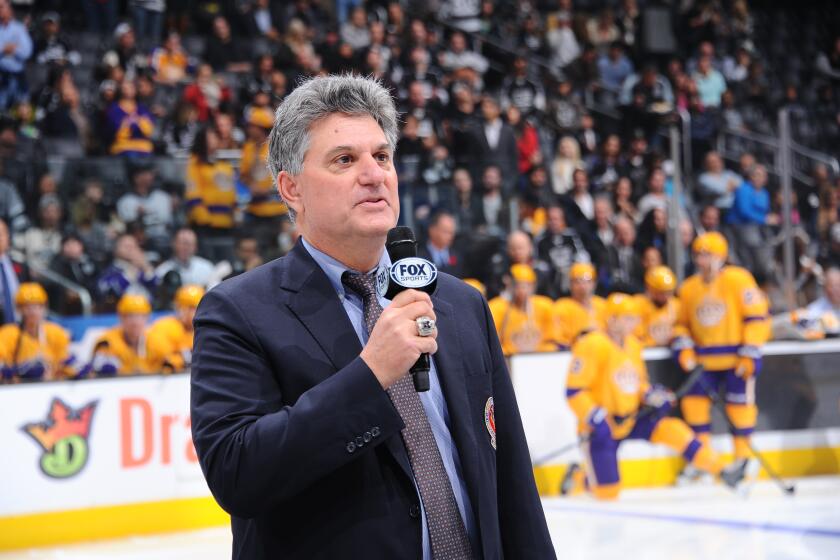New NHLPA executive director understands challenges posed by Gary Bettman and owners

- Share via
Marty Walsh learned how to build scaffolding and walls while working rugged construction jobs along Boston’s waterfront. Later, as the leader of laborers’ union local 223 and president of the building trades council, he learned how to build consensus between workers and management.
Walsh, the son of Irish immigrants, put his negotiating skills to good use as a member of the Massachusetts House of Representatives and as mayor of Boston from 2014-2021. He brought his pro-worker perspective to the White House as Secretary of Labor in the Biden Administration, drawing criticism when he walked a picket line alongside striking Kellogg’s workers.
He helped broker a settlement between unions and freight rail companies that averted a national rail strike last year and became involved in a labor dispute that clogged West Coast ports, including Los Angeles. He was a go-between during the 2022 Major League Baseball lockout, dining and speaking with leaders on both sides.
Adam Johnson, who played with the Kings’ top farm team in Ontario in 2022, died during a game in England when his neck was slashed by a skate blade.
All of which is an unusual prelude to his role as executive director of the NHL Players’ Assn., a job he started in March. Negotiating with NHL Commissioner Gary Bettman might make Walsh — who is not a lawyer — feel nostalgic for his days of hard manual labor.
Bettman has presided over the NHL for 30 years. Walsh is the NHLPA’s sixth leader during that span, following Bob Goodenow, Ted Saskin, Paul Kelly, Ian Penny and Donald Fehr.
Bettman is entrenched because he has stratospherically raised franchise values, making happy campers of his bosses, the owners. He holds a heavy hammer and has used it to impose three lockouts, taking the drastic step of canceling the 2004-05 season to get a hard salary cap. He kept players out of the last two Olympics, much to their displeasure.
For Walsh, this is unlike any professional situation he has faced before.
“You have a strong commissioner. You have 32 owners and many of those teams have multiple owners. So you’re not dealing with just one person on a team. You’re dealing with multiple factions on a team,” he said during a phone conversation. “You’re dealing with a commissioner that’s been in the league for a long time. He’s gone through several NHLPA executive directors. It’s in some ways challenging, but it’s a unique perspective.”
Walsh’s reaction to the NHL’s announcement it had banned players from putting rainbow-colored Pride tape on their sticks (or any tape supporting social causes) hinted at his behind-the-scenes deal-making approach.
The NHL banned themed jerseys in June after a handful of players, citing religious or security issues, refused to participate in Pride-themed events last season. A memo to teams in early October specified gear couldn’t be altered, eliminating the use of Pride tape. LGBTQ+ advocates condemned the decision. The NHLPA’s social media silence seemed deafening.
NHL Commissioner Gary Bettman might be despised by fans, but his smart and calculating tactics have reaped financial success for the league’s teams.
In the meantime, Walsh — who described himself as a longtime and staunch supporter of LGBTQ+ rights — was talking to the NHL, the Player Inclusion committee, and the You Can Play project about reversing the ban. Last week, the league lifted its ban on pride-themed and other tape.
“I don’t publicly want to have a conversation about how we fix things or how we get things resolved,” Walsh said. “I commend the players of the NHL for speaking up and speaking out, who were upset with the fact of the ruling of the pride tapes and other tapes.
“As a PA I don’t necessarily feel I have a responsibility to comment on every single thing that happens. We will comment when we have to but on that one, we were able to work collectively to turn that around and get in the right direction.”
Walsh, 56, had no plan to leave President Biden’s cabinet when he was contacted by a recruiting firm hired to find Fehr’s successor. Walsh wasn’t familiar with the NHLPA’s purpose, but he was intrigued. “I thought it would be interesting because it’s kind of back to my roots as a labor leader,” he said. “So I said I would have some conversations.”
That led to an offer. “It was nothing I was looking for. If you asked me the day before I got the call, ‘Would you ever consider it?’ I probably would have told you I don’t know how to consider it. I wouldn’t know how to do it,” he said. “When I got reached out to, I was like, ‘Wow, this is amazing.’
“It’s a labor union. That’s what we are. We’re a labor union representing hockey players. There are issues, and complicated issues. And there’s collective bargaining and a whole bunch of things that are just like any union in the country.”
There are many differences, too. NHLPA membership is younger than that of many other unions, and their professional prime is shorter. With that in mind, Walsh hopes to ramp up educational and post-career programs, along with health, wellness, and mental health services.
He also wants to establish a consistent schedule for international events, starting with sending players to the 2026 and 2030 Olympics and staging World Cup tournaments in 2028 and 2032. In that, as with everything, he must balance the interests of superstars who generate attention and revenues against third- and fourth-line forwards and marginal players.
In his 43rd season with the Kings, Nick Nickson tries to find the right balance for the television and radio audiences.
“When you come here, people assume that you represent millionaire hockey players,” he said. “And there’s no question there are millionaire hockey players, but there are also hundreds of players that don’t make millions of dollars.”
The collective bargaining agreement between the NHL and NHLPA expires on Sept. 15, 2026, and Walsh said the union likely will start discussing talking points next year, after he hears players’ concerns. The salary cap has stagnated since COVID-19 struck the gate-dependent NHL, rising only $2 million from 2019-20 to $83.5 million this season. But as players pay off the escrow debt they accrued when hockey-related revenues dropped below the negotiated 50-50 split, the cap is projected to hit $87.5 million in 2024-25 and $92 million in 2025-26.
“I think financially the players and the league are in a better position,” Walsh said. “What I want, myself and the players, is to work with the teams and the league in growing the game of hockey. I have lots of ideas and we have lots of ideas on how to do that.”
His ability to build on those ideas will determine his success. Expect some of the heavy lifting to take place behind the scenes.
More to Read
Go beyond the scoreboard
Get the latest on L.A.'s teams in the daily Sports Report newsletter.
You may occasionally receive promotional content from the Los Angeles Times.










